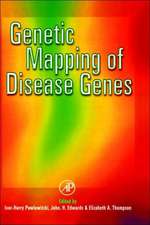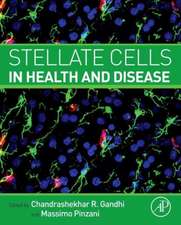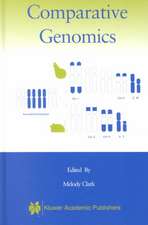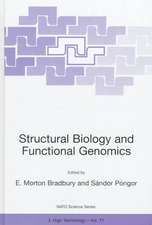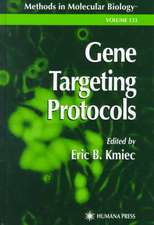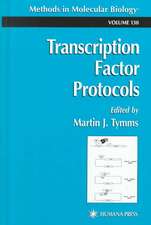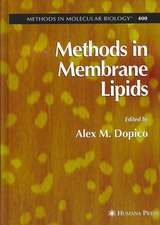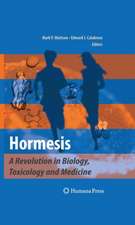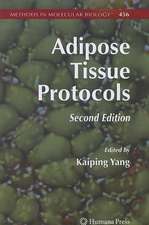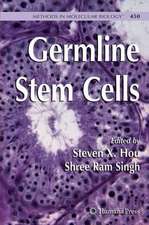Disease Gene Identification: Methods and Protocols: Methods in Molecular Biology, cartea 1706
Editat de Johanna K. DiStefanoen Limba Engleză Hardback – 9 feb 2018
Authoritative and practical, Disease Gene Identification: Methods and Protocols, Second Edition aims to help with the identification and characterization of many more disease-related genes and provide novel, and effective strategies for disease treatment and prevention.
| Toate formatele și edițiile | Preț | Express |
|---|---|---|
| Paperback (2) | 769.17 lei 43-57 zile | |
| Humana Press Inc. – 23 aug 2016 | 769.17 lei 43-57 zile | |
| Springer – 6 iun 2019 | 792.92 lei 38-44 zile | |
| Hardback (2) | 1086.60 lei 43-57 zile | |
| Humana Press Inc. – 10 ian 2011 | 1086.60 lei 43-57 zile | |
| Springer – 9 feb 2018 | 1277.75 lei 43-57 zile |
Din seria Methods in Molecular Biology
- 60%
 Preț: 347.95 lei
Preț: 347.95 lei - 23%
 Preț: 598.56 lei
Preț: 598.56 lei -
 Preț: 496.79 lei
Preț: 496.79 lei - 20%
 Preț: 882.95 lei
Preț: 882.95 lei -
 Preț: 252.04 lei
Preț: 252.04 lei - 5%
 Preț: 714.88 lei
Preț: 714.88 lei - 5%
 Preț: 716.65 lei
Preț: 716.65 lei - 5%
 Preț: 726.33 lei
Preț: 726.33 lei - 5%
 Preț: 732.06 lei
Preț: 732.06 lei - 15%
 Preț: 650.04 lei
Preț: 650.04 lei - 18%
 Preț: 1004.55 lei
Preț: 1004.55 lei - 5%
 Preț: 719.71 lei
Preț: 719.71 lei - 18%
 Preț: 895.67 lei
Preț: 895.67 lei - 15%
 Preț: 651.17 lei
Preț: 651.17 lei - 15%
 Preț: 640.89 lei
Preț: 640.89 lei - 18%
 Preț: 1386.03 lei
Preț: 1386.03 lei - 5%
 Preț: 727.59 lei
Preț: 727.59 lei - 20%
 Preț: 821.63 lei
Preț: 821.63 lei - 18%
 Preț: 952.59 lei
Preț: 952.59 lei - 15%
 Preț: 647.15 lei
Preț: 647.15 lei - 5%
 Preț: 723.48 lei
Preț: 723.48 lei - 18%
 Preț: 964.97 lei
Preț: 964.97 lei - 5%
 Preț: 718.46 lei
Preț: 718.46 lei -
 Preț: 392.58 lei
Preț: 392.58 lei - 5%
 Preț: 731.17 lei
Preț: 731.17 lei - 18%
 Preț: 943.15 lei
Preț: 943.15 lei - 23%
 Preț: 860.21 lei
Preț: 860.21 lei - 15%
 Preț: 639.44 lei
Preț: 639.44 lei - 5%
 Preț: 1034.11 lei
Preț: 1034.11 lei - 23%
 Preț: 883.85 lei
Preț: 883.85 lei -
 Preț: 792.16 lei
Preț: 792.16 lei -
 Preț: 423.62 lei
Preț: 423.62 lei - 5%
 Preț: 425.91 lei
Preț: 425.91 lei -
 Preț: 592.20 lei
Preț: 592.20 lei - 5%
 Preț: 345.62 lei
Preț: 345.62 lei - 19%
 Preț: 491.88 lei
Preț: 491.88 lei - 5%
 Preț: 1038.84 lei
Preț: 1038.84 lei - 5%
 Preț: 524.15 lei
Preț: 524.15 lei - 18%
 Preț: 2079.22 lei
Preț: 2079.22 lei - 5%
 Preț: 1272.89 lei
Preț: 1272.89 lei -
 Preț: 789.93 lei
Preț: 789.93 lei - 5%
 Preț: 1339.10 lei
Preț: 1339.10 lei - 18%
 Preț: 1362.07 lei
Preț: 1362.07 lei - 5%
 Preț: 752.66 lei
Preț: 752.66 lei - 5%
 Preț: 374.89 lei
Preț: 374.89 lei - 18%
 Preț: 1367.31 lei
Preț: 1367.31 lei - 18%
 Preț: 1106.74 lei
Preț: 1106.74 lei - 18%
 Preț: 1379.69 lei
Preț: 1379.69 lei - 18%
 Preț: 1102.11 lei
Preț: 1102.11 lei - 18%
 Preț: 946.69 lei
Preț: 946.69 lei
Preț: 1277.75 lei
Preț vechi: 1345.00 lei
-5% Nou
Puncte Express: 1917
Preț estimativ în valută:
244.54€ • 254.01$ • 203.12£
244.54€ • 254.01$ • 203.12£
Carte tipărită la comandă
Livrare economică 03-17 februarie 25
Preluare comenzi: 021 569.72.76
Specificații
ISBN-13: 9781493974702
ISBN-10: 149397470X
Pagini: 336
Ilustrații: X, 400 p. 63 illus., 50 illus. in color.
Dimensiuni: 178 x 254 mm
Greutate: 0.93 kg
Ediția:2nd ed. 2018
Editura: Springer
Colecția Humana
Seria Methods in Molecular Biology
Locul publicării:New York, NY, United States
ISBN-10: 149397470X
Pagini: 336
Ilustrații: X, 400 p. 63 illus., 50 illus. in color.
Dimensiuni: 178 x 254 mm
Greutate: 0.93 kg
Ediția:2nd ed. 2018
Editura: Springer
Colecția Humana
Seria Methods in Molecular Biology
Locul publicării:New York, NY, United States
Cuprins
Identification of Disease Susceptibility Alleles in the Next Generation Sequencing Era.- Induced Pluripotent Stem Cells in Disease Modeling and Gene Identification.- Development of Targeted Therapies Based on Gene Modification.- What can we Learn about Human Disease from the Nematode C. elegans?.- Microbiome Sequencing Methods for Studying Human Diseases.- The Emerging Role of Long Noncoding RNAs in Human Disease.- Identification of Disease-related Genes using a Genome-wide Association Study Approach.- Whole Genome Library Construction for Next Generation Sequencing.- Whole Exome Library Construction for Next Generation Sequencing.- Optimized Methodology for the Generation of RNA-sequencing Libraries from Low-input Starting Material: Enabling Analysis of Specialized Cell Types and Clinical Samples.- Using C1 to Generate Single-cell Full-length cDNA Libraries for mRNA Sequencing.- MiSeq: A Next Generation Sequencing Platform for Genomic Analysis.- Methods for CpG Methylation Array Profiling via Bisulfite Conversion.- miRNA Quantification Method using Quantitative Polymerase Chain Reaction in Conjunction with the Cq Method.- Lentiviral--mediated CRISPR--cas9 Gene Editing of Primary Human Airway Epithelial Cells.- RNA Interference to Knockdown Gene Expression.- Using Luciferase Reporter Assays to Identify Functional Variants at Disease-associated Loci.- Physiologic Interpretation of GWAS Signals for type 2 Diabetes.- Identification of Genes for Hereditary Hemochromatosis.- Identification of Driver Mutations in Rare Cancers: The Role of SMARCA4 in Small Cell Carcinoma of the Ovary, Hypercalcemic Type (SCCOHT).- The Rise and Fall and Rise of Linkage Analysis as a Technique for Finding and Characterizing Inherited Influences on Disease Expression.
Textul de pe ultima copertă
This volume presents detailed laboratory procedures in an easy to follow format that can be carried out with success by investigators lacking previous exposure to a specific research method. Chapter guide readers through the application of molecular approaches to disease gene identification and overviews, and case studies are also presented. Written in the highly successful Methods in Molecular Biology series format, chapters include introductions to their respective topics, lists of the necessary materials and reagents, step-by-step, readily reproducible laboratory protocols, and tips on troubleshooting and avoiding known pitfalls.
Authoritative and practical, Disease Gene Identification: Methods and Protocols, Second Edition aims to help with the identification and characterization of many more disease-related genes and provide novel, and effective strategies for disease treatment and prevention.
Authoritative and practical, Disease Gene Identification: Methods and Protocols, Second Edition aims to help with the identification and characterization of many more disease-related genes and provide novel, and effective strategies for disease treatment and prevention.
Caracteristici
Includes cutting-edge methods and protocols Provides step-by-step detail essential for reproducible results Contains key notes and implementation advice from the experts
Recenzii
From the reviews:
“This is an excellent resource for innovative approaches to the identification of genes contributing to complex human diseases. … presenting detailed laboratory procedures in an easy-to-follow format that can be carried out successfully by competent experts lacking exposure to a specific research method. … will be useful for clinicians such as oncologists interested in learning about gene identification. … an excellent resource for graduate students, postdoctoral researchers, bench scientists, clinical oncologists, and hematologists interested in the fields of molecular genetics and molecular biology.” (Omer Iqbal, Doody’s Review Service, June, 2011)
“This is an excellent resource for innovative approaches to the identification of genes contributing to complex human diseases. … presenting detailed laboratory procedures in an easy-to-follow format that can be carried out successfully by competent experts lacking exposure to a specific research method. … will be useful for clinicians such as oncologists interested in learning about gene identification. … an excellent resource for graduate students, postdoctoral researchers, bench scientists, clinical oncologists, and hematologists interested in the fields of molecular genetics and molecular biology.” (Omer Iqbal, Doody’s Review Service, June, 2011)

